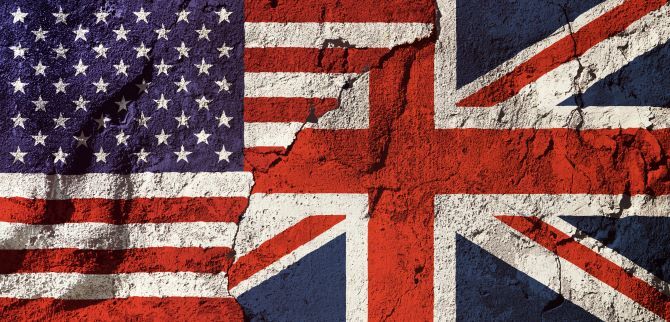Will November’s election make US trade deals more likely?
Something unexpected happened over the summer: Rachel Reeves, recently appointed the UK's new chancellor of the exchequer, was quoted as saying she would try to revive trade deal talks with the US if Donald Trump won November’s presidential election. David Sapsted reports.
 5 September 2024
5 September 2024This article is taken from the Autumn 2024 issue of
Think Global People magazine
Click on the cover to access the digital edition.True, the report was based on remarks Ms Reeves had made last February to the ‘Daily Telegraph’ when she was still an opposition MP. The newspaper only published them after Labour’s victory in July’s election.Still, eyebrows were raised over her apparent determination “to do deals around the world”, including with a Mr Trump-led America. Indeed, Foreign Secretary David Lammy – previously a harsh critic of Mr Trump – has been busy wooing pro-Trump Republicans since coming to office, even meeting vice presidential candidate JD Vance and praising his autobiography, ‘Hillbilly Elegy’.
Potential impact of increased US protectionism globally
Alicia García-Herrero, senior fellow at EU policy think-tank Bruegel, believes that Mr Trump’s choice of Mr Vance as his running mate suggests his protectionist stance is just as strong, or maybe stronger, than it was when he was president from 2017– 2021.According to Ms García-Herrero, Mr Vance has repeatedly emphasised the “need to protect American industries” from global competition. This through “broad-based tariffs, especially on goods coming in from China”.Ms García-Herrero told Brussels-based news website Euractiv: “If we had any doubt as to whether Trump was going to be a different Trump, a more appealing Trump for Europe, for whatever reason, I think by now we know.”She suggested that EU leaders would probably attempt to offset the Trump-Vance isolationism by engaging in “frantic action” to forge deeper economic and research partnerships with other “like-minded partners”, such as the UK, Canada, Australia, South Korea and Japan.Mr Trump does now seem to be an even more hardened protectionist than before. If elected in November, he is proposing to impose at least a 10% tariff on all imports, rising to 60% on Chinese goods. His right-wing tendencies also scarcely fit easily with the new British government's left-of-centre leanings.“Protectionist trends will clearly be worse under a second Trump term,” according to John Clarke, former head of the EU delegation to the World Trade Organisation. “Whether it’s Trump or [Democratic presidential candidate, Kamala] Harris – and let’s hope to God it’s Harris and the Democrats – the US priority is going to remain economic security, domestic competitiveness and industrialisation, as it is likely to be the case for Europe.”Read related articles
- New UK government sets intentions for international trade talks and growth
- New UK foreign secretary sets intentions
- Global mobility supply and demand: What is happening in the corporate world?
Key points for unlocking trade deals with US
Additionally, there are practical barriers to be overcome. Most notably, the UK’s refusal to accept imports of hormone-treated beef and chlorinated chicken. The issue scuppered a hoped-for free trade agreement between Mr Trump and then-PM Boris Johnson in 2020. And, at the start of this year, led to talks over a UK trade deal with Canada collapsing.Even if Ms Harris wins in November, most trade analysts are not optimistic of a deal. Although she is not regarded as being as adversarial as Mr Trump and has extensive overseas experience in her time as vice president, Ms Harris is not seen as any more prone to doing trade deals than Joe Biden. Indeed, she was only one of a handful of Democrat senators to vote against US participation in the CPTPP.There is also more at stake than trade. The Republicans’ determination to reduce immigration and the Democratic Party’s uneasy stance on the issue could lead to measures that would reduce global mobility. Although the overwhelming attention on immigration in the US focuses on the Mexican border, Mr Trump also appears ready, as he was before, to restrict some forms of legal migration. On this year’s campaign website, he says he would “deliver a merit-based immigration system that protects American labour and promotes American values”.As for the likely effects on markets, an analysis published by VoxEU – the policy portal of the Centre for Economic Policy Research (CEPR) – concluded that the likelihood of a Trump victory would increase the volatility in the US bond market; reduce the oil price; decrease equity market volatility and boost stock prices.“Thus, financial markets expect a Trump administration to be relatively more market-oriented than [Kamala Harris’s], less focused on environmental concerns and on the sustainability of public debt,” said the report.But while international financial markets might be quietly confident come November, international producers and the mobility industry are less likely to be so.
Find out more about the Think Global People and Think Women community and events.

Subscribe to Relocate Extra, our monthly newsletter, to get all the latest international assignments and global mobility news.Relocate’s new Global Mobility Toolkit provides free information, practical advice and support for HR, global mobility managers and global teams operating overseas.
©2025 Re:locate magazine, published by Profile Locations, Spray Hill, Hastings Road, Lamberhurst, Kent TN3 8JB. All rights reserved. This publication (or any part thereof) may not be reproduced in any form without the prior written permission of Profile Locations. Profile Locations accepts no liability for the accuracy of the contents or any opinions expressed herein.











































